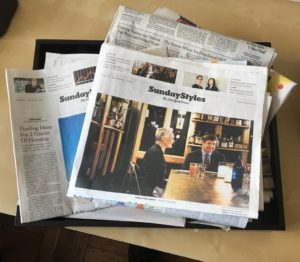We all acknowledge a need to look beyond the Orange Bubble. Particularly since the election, I’ve felt it even more necessary to keep up with the world. At the start, I found myself engrossed by news stories on Facebook, Google, and iNews. Quickly, though, I realized I was in another sort of bubble, as these are all limited by your friend networks, political leanings, and past searches. Hearing others express similar concern, I reached out to a number of friends to see what strategies they use to look outside the bubble while also balancing a busy work schedule. The following tips are some ideas I got from them.
- Listen to short news stories when walking places. Lots of people listen to music while walking to class. Why not plug in your headphones and listen to the news? One friend uses the NPR app to listen to 3-8 minute long stories while on the way to class: a simple means of following current events.
- Listen to podcasts. For longer news stories, it’s easy to download podcasts from NPR or other major news outlets. One friend told me about “Pod Save America,” maintained by former Obama speechwriters. Podcasts are ideal for lengthier activities: listen while you exercise, as you get ready in the morning, or when you’re on a long train ride.

Of course, you could always do it the old-fashioned way and get a physical copy of the newspaper!
- Read a few articles a day. You might browse the New York Times, Washington Post, Guardian, Al Jazeera, or any other major news outlet to get a balanced treatment of what people are talking about. It might also be helpful to choose a time of day for doing this. For instance, I set my Google Chrome home screen to the NYT website and, every morning, look at the top headlines. I also follow their page on the Americas, to keep up-to-date on which news stories from Latin America reach the US. This was particularly interesting for me when I returned from Rio de Janeiro this past summer, as I enjoyed comparing American coverage of the Olympics to the feelings of discontent I noticed among my Brazilian friends.
- Join a news briefing email list. There are a number of services, like the New York Times Morning Briefing and the Daily Skimm, that will send you daily emails summarizing the day’s top news stories. PCUR Correspondent Zoe Sims also told me about listservs designed to foster discussion within fields. She is on one called Coral-List, which is — in her words — “basically MatheyMail for coral people.” Researchers send ads for PhD/postdoc openings, propose questions for the community, share links to articles, and even initiate discussion threads about politically charged issues.
Of course, there are many other ways to get your news, and I encourage you to explore! Ultimately, you have to find what works for you and then make it a habit. While it might feel like a burden at first, it may actually prove to be relevant to your studies. Furthermore, on an insular college campus, it may be a form of self-care: a way to look outside your own world and put things in perspective.
— Dylan Blau Edelstein, Humanities Correspondent

